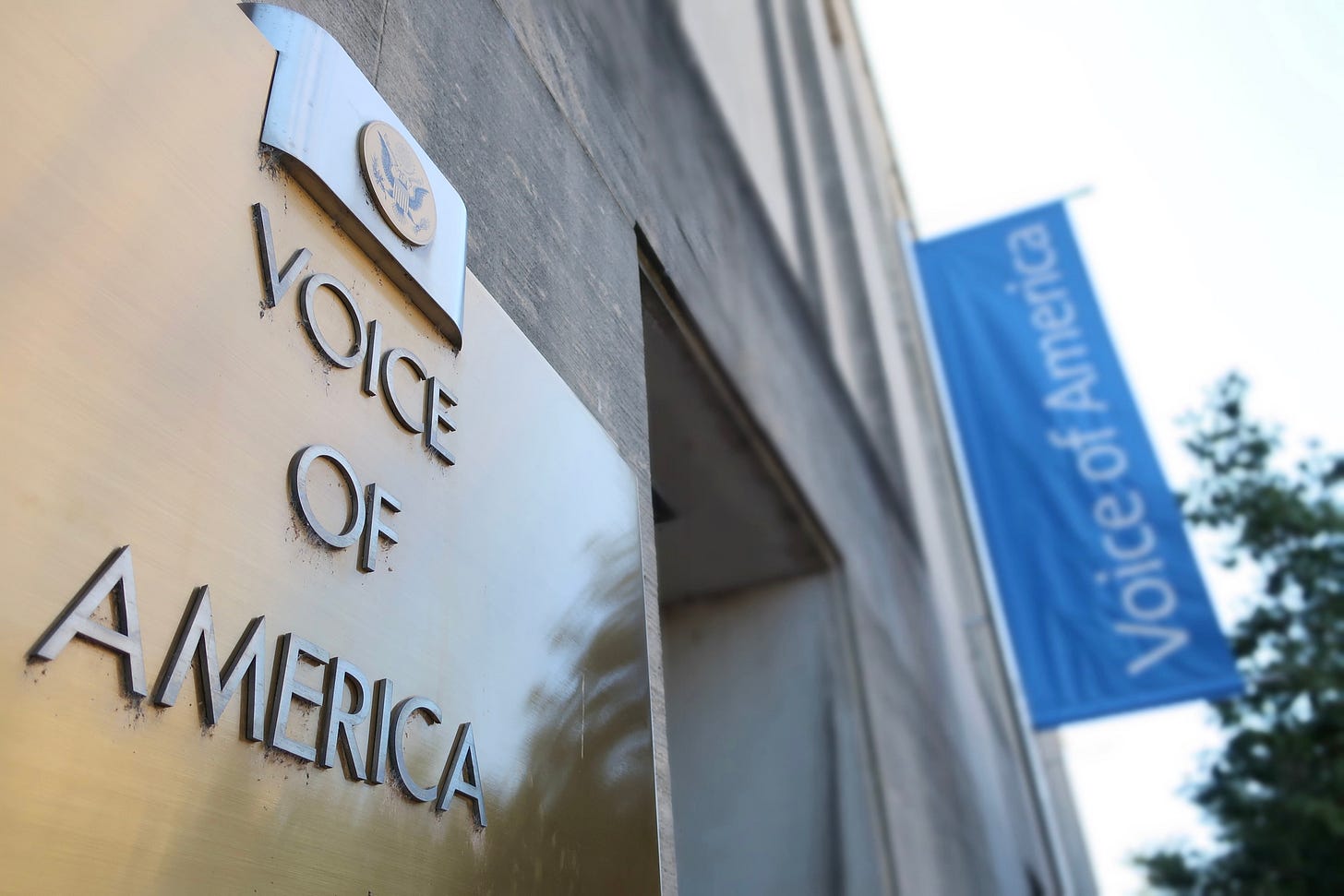Silencing VOA Is Like Silencing America
Voice of America has been a pillar of U.S. diplomacy for decades. Its loss is a loss for democracy worldwide
By Marvin Kalb
Have you ever heard of Willis Conover?
You would have if you were a young Russian, tired of communist propaganda during the Cold War, desperate to listen to the swing and jazz music of the West. Late at night, after you assumed the censor had gone to bed, you’d turn on the Voice of America and listen to “Jazz Ambassador Conover,” as he was called, host two hours of modern American music, interspersed with segments of news. No matter how hot and hostile was the Kremlin’s anti-American propaganda that day, the night and the music belonged to the Voice of America, democracy’s super salesman.
It was the most popular post-midnight program in Moscow. Whenever I spoke with young Russians as a foreign correspondent, they would raise, with subdued delight, their admiration for American music and, by extension, America. Not all of them, of course, but many of them. The Voice of America was worth every penny, then and now. With a few other government-sponsored international networks, such as Radio Free Europe and the Middle East Broadcasting Network, it reaches 420 million people in 63 languages in more than 100 countries every week. In today’s fractured world of broadcasting, those are mighty impressive numbers. But, sadly, that will no longer be the case.
In its rushed, rule-breaking effort to discredit and censor the news, to present only its version of reality, the Trump administration has begun to dismantle still one more pillar of American democracy. Founded during World War II, Voice of America helped sell America to generations behind the Iron Curtain and since the collapse of communism in 1991 to others around the world yearning for the truth, honesty and the possibility of democracy. President Donald Trump, in an executive order signed over the weekend, has now “eliminated” the Voice of America and placed more than 1,000 journalists on “indefinite leave.” The President’s decision is another decisive step towards an authoritarian form of government, away from the “freedom of the press” guaranteed in the First Amendment of the U.S. Constitution. It seems the White House is testing the constitutional limits of its arbitrary actions.
Just a few months ago, Trump sounded as if he favored the continuation of the Voice of America, provided that its leadership “ensure that the American values of Freedom and Liberty are broadcast around the world FAIRLY AND ACCURATELY, unlike the lies spread by the Fake News Media.” Apparently he has again changed his mind, as he has so often with tariffs that are on one day and off the next, and this has prompted loyal officials to echo his switch in tone and attitude.
Richard Grenell, who is Trump’s envoy for special missions, and the new administrator of the Kennedy Center, tried softening the gravity of the Voice’s impending passing. “It is a relic of the past,” he proclaimed. “We don’t need government paid media outlets.”
Elon Musk, the president’s moneyman, quickly echoed Grenell. “Yes, shut them down…Nobody listens to them anymore.”
But everyone does listen to Donald Trump, or should, in the judgment of Musk and his other enablers. The Voice of this administration now belongs solely to the president, who seems to be on television, his favorite means of communication, from morning till night, and who expresses nuances of foreign and domestic policy on social media, often in capital letters. If anyone else expresses an opinion, it is immediately ascribed to Trump, who, according to an unembarrassed Marco Rubio, is “the only person on this planet” who can bring peace to Ukraine. Four times in a recent four-minute TV interview Rubio used that remarkable expression. The Secretary of State had no opinion of his own—none that he chose to express, anyway.
This huge structure, once called the US government, which spoke with many voices to many people in so many countries, now has only one voice. It sounds like that of an aging golfer from Mar-a-Lago who still speaks with a New York accent.
Marvin Kalb, Murrow professor emeritus at Harvard, is a former network correspondent and the author of A DIFFERENT RUSSIA: Khrushchev and Kennedy on a Collision Course.





I hope short-wave radio operators are listening and take up the slack as I understand they did before VOA.
In the spirit of Jen Rubin’s words and phrases we can do without, you have convinced me that we can do without a voice of America when that voice is only Donal Trump’s.
Thank you—I had a favorable perception of the VOA but did not know it reached so many people in the world.